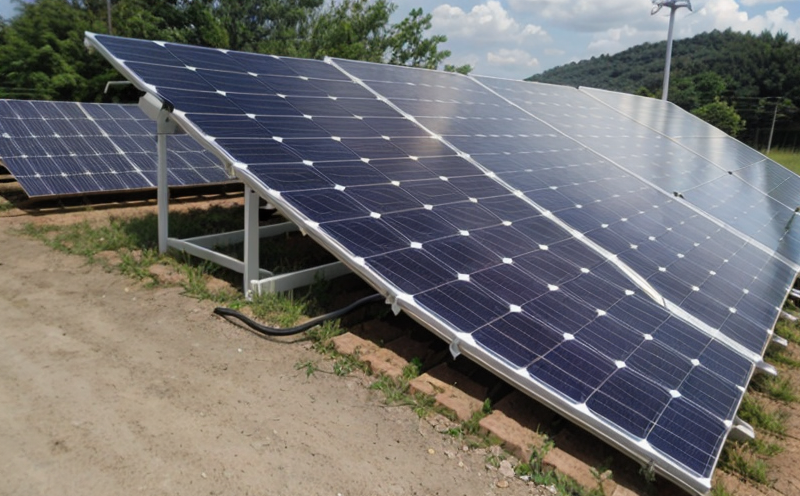UL 61730 Photovoltaic Module Safety Certification Testing
The UL 61730 standard sets stringent safety requirements for photovoltaic (PV) modules, which are critical components in renewable energy systems. Compliance with this standard ensures the safe operation of PV systems, reducing risks associated with electrical faults and fires. This service focuses on the comprehensive testing required to obtain certification under UL 61730, ensuring that solar panel manufacturers meet all necessary safety criteria.
The testing process involves a series of rigorous tests designed to simulate real-world conditions and potential hazards that PV modules may encounter during their operational lifecycle. These tests are essential for validating that the products perform safely in environments where they will be used. The standard encompasses various aspects such as electrical insulation, mechanical strength, fire resistance, and other safety features.
UL 61730 certification is a crucial step for manufacturers looking to enter competitive markets or meet regulatory requirements. This certification not only enhances the reputation of the product but also ensures that it meets international standards set by recognized organizations like Underwriters Laboratories (UL). By adhering to these stringent safety protocols, manufacturers can ensure their PV modules are reliable and safe for end-users.
The testing process typically includes a range of methodologies aimed at assessing different aspects of module performance. Electrical insulation tests check the integrity of internal connections and external wiring. Mechanical strength tests assess how well the module withstands physical stresses such as wind loading, snow accumulation, and temperature cycling. Fire resistance tests evaluate the module's ability to resist ignition and spread of flames.
One of the key aspects of UL 61730 testing is ensuring that each PV module is properly labeled with all relevant information about its specifications and performance characteristics. This labeling helps users quickly identify important details such as power ratings, operating temperature ranges, and connection requirements. Proper labeling also ensures compliance with international regulations regarding product identification.
In summary, UL 61730 Photovoltaic Module Safety Certification Testing is an essential service for manufacturers aiming to ensure their products meet the highest safety standards in the industry. By providing thorough testing services according to this standard, we help our clients create trustworthy and reliable PV modules that can be used with confidence by consumers worldwide.
Why It Matters
The importance of UL 61730 Photovoltaic Module Safety Certification Testing cannot be overstated. Compliance with this standard is a critical requirement for the solar energy sector, ensuring that photovoltaic modules are safe and reliable throughout their operational lifecycle.
- Reduces risks associated with electrical faults and fires
- Enhances reputation of products in competitive markets
- Maintains compliance with international regulatory requirements
- Ensures consistent quality across different manufacturing processes
The rigorous testing protocols outlined in UL 61730 help identify potential hazards early in the production process, allowing manufacturers to address issues before they become safety concerns. This proactive approach not only improves product reliability but also protects consumers from potential risks.
Moreover, obtaining certification under this standard demonstrates a commitment to quality and safety, which is increasingly important as governments around the world implement stricter regulations for renewable energy technologies. By meeting these stringent requirements, manufacturers can gain an edge in the marketplace and build trust with their customers.
In conclusion, UL 61730 Photovoltaic Module Safety Certification Testing is not just a formality; it represents a commitment to excellence in product design and manufacturing. It plays a vital role in safeguarding both end-users and manufacturers involved in the solar energy industry.
Benefits
- Enhanced Product Safety: Ensures that PV modules meet stringent safety standards, reducing risks associated with electrical faults and fires.
- Market Access: Provides a competitive advantage by allowing access to markets that require UL certification for solar products.
- Consumer Trust: Builds trust among consumers who are assured of the reliability and safety of certified PV modules.
- Regulatory Compliance: Helps manufacturers comply with international regulatory requirements, avoiding potential legal issues and fines.
- Improved Reputation: Demonstrates a commitment to quality and safety, enhancing the reputation of both the manufacturer and their products.
- Increased Efficiency: Identifies potential issues early in the production process, allowing manufacturers to make necessary adjustments before mass production begins.
The benefits of UL 61730 Photovoltaic Module Safety Certification Testing extend beyond just safety; they also contribute significantly to the overall success and reputation of solar energy companies. By adhering to these standards, manufacturers can ensure that their products are safe, reliable, and trustworthy, thereby gaining a competitive edge in an increasingly demanding market.
Industry Applications
| Application | Description |
|---|---|
| Solar Power Plants | Ensures the safe and reliable operation of photovoltaic systems in large-scale solar power plants, contributing to grid stability and efficiency. |
| Residential Solar Systems | Guarantees that residential solar panels meet safety standards, protecting homeowners from potential hazards while enhancing system performance. |
| Solar Farms | Aids in the safe deployment of photovoltaic modules in remote locations, ensuring long-term reliability and reducing maintenance costs. |
| Commercial Buildings | Supports the integration of solar energy into commercial buildings, promoting sustainability initiatives and reducing operational expenses. |
The applications for UL 61730 Photovoltaic Module Safety Certification Testing are wide-ranging, encompassing various sectors within the renewable energy industry. From large-scale solar power plants to residential installations, this certification plays a crucial role in ensuring that photovoltaic modules perform safely and efficiently.





